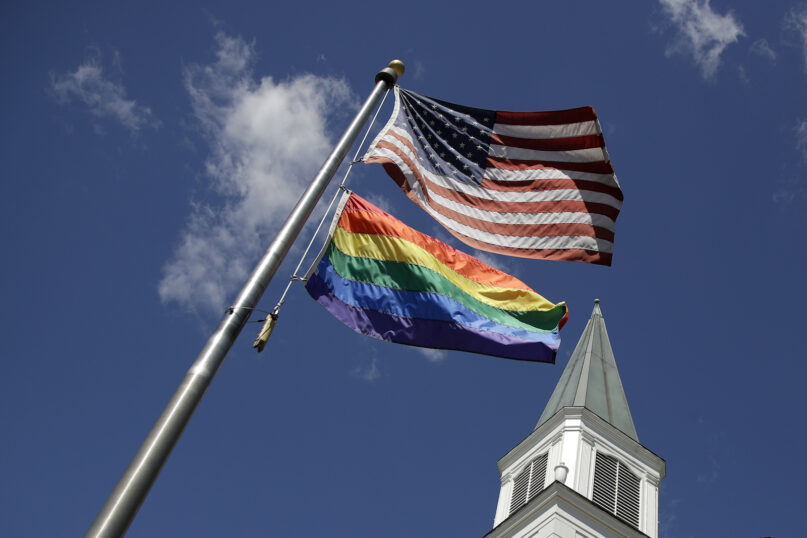(RNS) — In one of the last decisions announced this season, the U.S. Supreme Court ruled that a conservative Christian business owner had the right to refuse service to same-sex couples if the service could be construed as a creative expression or implied endorsement of their relationship. The ruling, the latest in a series of such cases, affirmed a common narrative: that religious people and LGBTQ+ people are mutually exclusive groups and in tension with one another.
This story isn’t only perpetuated in the courts, but also in the mainstream media and, often, in the field of public opinion research.
As academics and public fellows for the Public Religion Research Institute, we have access to some of the latest national surveys asking questions about religion and LGBTQ+ rights. We also know that most of the time this data includes too few LGBTQ+ people to make definitive claims about this group. We know, in other words, that we know more about attitudes about LGBTQ+ people than we do about LGBTQ+ people themselves.
In early June, we set out to remedy this shortcoming by surveying 1,255 LGBTQ+ adults in the United States. While not a representative sample (we used the survey platform Prolific), we set quotas to make sure we surveyed at least 250 each of gay men, lesbian women, bisexual men, bisexual women and transgender and gender non-conforming people. The resulting data provides us a unique opportunity to explore and compare the beliefs, attitudes and experiences of queer people in the U.S.
Our findings suggest that the relationships LGBTQ+ people have with religion are more complicated than most media headlines portray. Many LGBTQ+ people are religious, with bisexual men reporting the strongest religious identities. In our sample, 36% of participants report a religious affiliation; about the same percentage say they attend religious services at least once a year. A similar percentage report spending time in prayer or meditation a few times a month or more.
Religion has often played an important role in the lives of LGBTQ+ people, even if they are not currently religious. A full 80% of survey respondents were raised religious. Of those who no longer identify religiously, nearly 1 in 3 say they nonetheless continue to feel a connection to their religious heritage.
At the same time, only a minority of religious LGBTQ+ individuals belong to congregations that explicitly affirm their sexual orientation and/or gender identity. Of religious LGBTQ+ people, 38% report that their congregation allows people in same-gender relationships to be congregation leaders, and 32% report that their congregation has an official statement welcoming LGBTQ+ individuals. Roughly the same percentage of religious LGBTQ+ individuals report experiencing conflict between their religious beliefs and sexual orientation or gender identity. These respondents came from a variety of Christian traditions, including Protestant, Roman Catholic and “just Christian.”
Transgender respondents, compared to gay and bisexual men and lesbian and bisexual women, report the highest levels of conflict between religion and their gender identity. This aligns with the broader social and political landscape in the United States, where, overall, Americans are less supportive of certain measures of transgender equality when compared to LGBTQ+ equality and there have been recent attacks on transgender rights led and supported by white evangelical Protestants.
Regardless of religious affiliation, LGBTQ+ people in our survey perceive high levels of hostility from most major religious groups. Eight out of 10 believe that evangelical churches are unfriendly toward LGBTQ+ people. The perception of unfriendliness is similarly high for the Church of Jesus Christ of Latter-day Saints (76%), Islam (71%) and Catholicism (70%).
Judaism is perceived as the friendliest among the six groups we asked about, with 3 in 4 respondents characterizing the religion as either friendly or neutral toward LGBTQ+ people, followed by a similar perception of non-evangelical Protestant churches (56%).
Although faith and participation in religion have been clearly linked to better health in heterosexual people, these effects are less strong for LGBTQ+ people. Our data supported these findings, showing that only LGBTQ+ people who saw religion as central to their identity could be linked to lower rates of depression. For queer people who may not feel connected to a religious community but still attend services, religion doesn’t offer this positive benefit.
While belonging to a religious community is not the generally “positive” experience it is for cisgender/heterosexual individuals, our understanding of LGBTQ+ people’s religious lives need to be more nuanced. When we asked open-ended questions in our survey, we found that LGBTQ+ people recognize that, while religious groups are often hostile toward them, it is religious extremists who seek to ostracize them or take away their rights. Some religious groups are even recognized as allies in the fight toward greater inclusion.
While religion and queerness may make strange bedfellows, many LGBTQ+ people realize these two forces are connected in complex ways. The rest of us should take the cue.
(Kelsy Burke is an associate professor of sociology at the University of Nebraska-Lincoln. Andrew Flores is an assistant professor of government at American University. Suzanna Krivulskaya is an assistant professor of history at California State University San Marcos. Tyler Lefevor is an associate professor of counseling psychology at Utah State University. The views expressed in this commentary do not necessarily reflect those of Religion News Service.)





